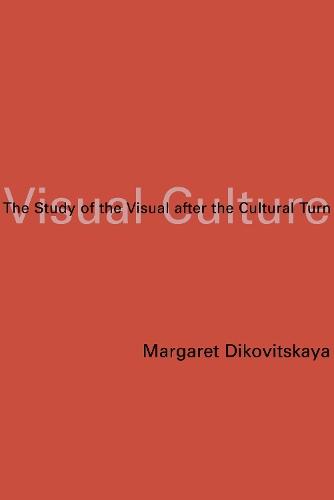
Visual Culture: The Study of the Visual after the Cultural Turn
(Paperback)
Publishing Details
Visual Culture: The Study of the Visual after the Cultural Turn
By (Author) Margaret Dikovitskaya
MIT Press Ltd
MIT Press
24th February 2006
United States
Classifications
Professional and Scholarly
Non Fiction
700
Physical Properties
Paperback
326
Width 152mm, Height 229mm, Spine 19mm
612g
Description
The history, theoretical frameworks, methodology, and pedagogy of the new field of visual culture; current debates and the possibility for future consensus.In recent years, visual culture has emerged as a growing and important interdisciplinary field of study. Visual culture regards images as central to the representation of meaning in the world. It encompasses "high" art without an assumption of its higher status. But despite the current proliferation of studies and programs in visual culture, there seems to be no consensus within the field itself as to its scope and objectives, definitions, and methods. In Visual Culture, Margaret Dikovitskaya offers an overview of this new area of study in order to reconcile its diverse theoretical positions and understand its potential for further research. Her aim is to show how visual culture can avoid what she defines as the Scylla and Charybdis that threaten it- the lack of a specific object of study (given its departure from the traditional hierarchies of art history) and the expansion of the field to the point of incoherence as it seems to subsume everything related to the cultural and the visual. Dikovitskaya gives us an archaeology of visual culture, examining the "cultural turn" away from art history and the emergence of visual studies. Drawing on responses to questionnaires, oral histories, and interviews with the field's leading scholars, she discusses first the field's history, theoretical frameworks, and methods, and then examines four programs and courses in visual culture-those at the University of Rochester, the University of Chicago, the University of California at Irvine, and the State University of New York at Stony Brook. Bringing together considerations of theory and practice, Dikovitskaya charts the future of visual culture programs in the twenty-first century.
Reviews
"Dikovitskaya's analyses of the institutions, pedagogical practices, and personalities of the new field of visual culture in the U.S. underline how specific a rigorous historiography of this emerging discipline must be. Her study is an invaluable resource for those who seek to understand the visual in today's culture."--Mark A. Cheetham, Graduate Department of History of Art, University of Toronto "*Visual Culture* offers a rich archaeology of the histories, disciplines, texts, people, and university programs that have shaped the emergence of visual culture in the US academy. With this ambitious and engaging work, produced amidst the continuing development of visual studies and aided by insightful interviews from scholars across disciplines, Margaret Dikovitskaya supplies readers with an intelligent account of the diverse theoretical positions and research and teaching methods that affect contemporary engagements with the object of visual culture. This is an essential guide for students in the young field of visual studies as well as scholars wrestling with the persistent question: 'What is visual culture'"--Raiford Guins, Founder and Principal Editor, *Journal of Visual Culture*, and Senior Lecturer in Contemporary Screen Media, University of the West of England "Dikovitskaya's micro-history of the emergence of the new interdiscipline of visual studies is an essential read for anyone who wants to understand a key development of Western intellectual life during the late twentieth century. Grounded in lively interviews with the field's major proponents, this book illuminates the relationship in which art, history, culture, and visuality are increasingly understood to stand to each other."--Ruth B. Phillips, Canada Research Chair in Modern Culture and Professor of Art History, Carleton University, Ottawa
Author Bio
Margaret Dikovitskaya is Landsdowne Professor of Art History at the University of Victoria, British Columbia.
